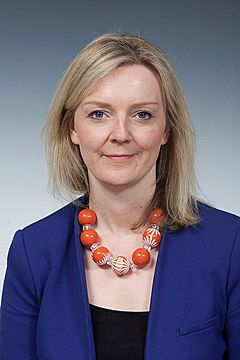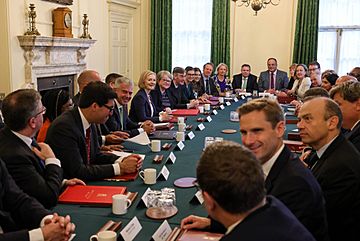Liz Truss facts for kids
Mary Elizabeth Truss, born on 26 July 1975, is a British politician. She served as the Prime Minister of the United Kingdom and Leader of the Conservative Party from September to October 2022. Her time as prime minister was the shortest in British history, lasting only 50 days.
Truss was a Member of Parliament (MP) for South West Norfolk from 2010 to 2024. Before becoming prime minister, she held several important roles in the government, including Foreign Secretary from 2021 to 2022.
Quick facts for kids
Liz Truss
|
|||||||||||||||||||||||||||||||||||||||||||||||||||||||||||||||||||||||||||
|---|---|---|---|---|---|---|---|---|---|---|---|---|---|---|---|---|---|---|---|---|---|---|---|---|---|---|---|---|---|---|---|---|---|---|---|---|---|---|---|---|---|---|---|---|---|---|---|---|---|---|---|---|---|---|---|---|---|---|---|---|---|---|---|---|---|---|---|---|---|---|---|---|---|---|---|
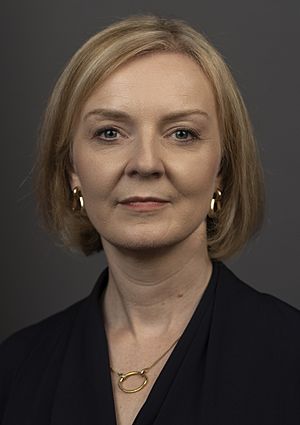
Official portrait, 2022
|
|||||||||||||||||||||||||||||||||||||||||||||||||||||||||||||||||||||||||||
| Prime Minister of the United Kingdom | |||||||||||||||||||||||||||||||||||||||||||||||||||||||||||||||||||||||||||
| In office 6 September 2022 – 25 October 2022 |
|||||||||||||||||||||||||||||||||||||||||||||||||||||||||||||||||||||||||||
| Monarch | |||||||||||||||||||||||||||||||||||||||||||||||||||||||||||||||||||||||||||
| Preceded by | Boris Johnson | ||||||||||||||||||||||||||||||||||||||||||||||||||||||||||||||||||||||||||
| Succeeded by | Rishi Sunak | ||||||||||||||||||||||||||||||||||||||||||||||||||||||||||||||||||||||||||
| Leader of the Conservative Party | |||||||||||||||||||||||||||||||||||||||||||||||||||||||||||||||||||||||||||
| In office 5 September 2022 – 24 October 2022 |
|||||||||||||||||||||||||||||||||||||||||||||||||||||||||||||||||||||||||||
| Preceded by | Boris Johnson | ||||||||||||||||||||||||||||||||||||||||||||||||||||||||||||||||||||||||||
| Succeeded by | Rishi Sunak | ||||||||||||||||||||||||||||||||||||||||||||||||||||||||||||||||||||||||||
|
|||||||||||||||||||||||||||||||||||||||||||||||||||||||||||||||||||||||||||
| Member of Parliament for South West Norfolk |
|||||||||||||||||||||||||||||||||||||||||||||||||||||||||||||||||||||||||||
| In office 6 May 2010 – 30 May 2024 |
|||||||||||||||||||||||||||||||||||||||||||||||||||||||||||||||||||||||||||
| Preceded by | Christopher Fraser | ||||||||||||||||||||||||||||||||||||||||||||||||||||||||||||||||||||||||||
| Succeeded by | Terry Jermy | ||||||||||||||||||||||||||||||||||||||||||||||||||||||||||||||||||||||||||
| Personal details | |||||||||||||||||||||||||||||||||||||||||||||||||||||||||||||||||||||||||||
| Born |
Mary Elizabeth Truss
26 July 1975 Oxford, England |
||||||||||||||||||||||||||||||||||||||||||||||||||||||||||||||||||||||||||
| Political party | Conservative (since 1996) | ||||||||||||||||||||||||||||||||||||||||||||||||||||||||||||||||||||||||||
| Other political affiliations |
Liberal Democrats (until 1996) | ||||||||||||||||||||||||||||||||||||||||||||||||||||||||||||||||||||||||||
| Spouse |
Hugh O'Leary
(m. 2000) |
||||||||||||||||||||||||||||||||||||||||||||||||||||||||||||||||||||||||||
| Children | 2 | ||||||||||||||||||||||||||||||||||||||||||||||||||||||||||||||||||||||||||
| Parent |
|
||||||||||||||||||||||||||||||||||||||||||||||||||||||||||||||||||||||||||
| Education | Merton College, Oxford (BA) | ||||||||||||||||||||||||||||||||||||||||||||||||||||||||||||||||||||||||||
| Signature |  |
||||||||||||||||||||||||||||||||||||||||||||||||||||||||||||||||||||||||||
Contents
Early Life and Education
Mary Elizabeth Truss was born on 26 July 1975 in Oxford, England. Her parents, John and Priscilla Truss, were politically left-leaning. Her father was a mathematics professor, and her mother was a teacher and nurse.
When Truss was four, her family moved to Paisley in Scotland. Later, they moved to Leeds, England, where she attended Roundhay School. At age 12, she spent a year in Canada, attending Parkcrest Elementary School. She praised the Canadian education system for encouraging students to excel.
Truss studied philosophy, politics and economics at Merton College, Oxford, graduating in 1996. During her university years, she was active in the Liberal Democrats party. She was even president of the Oxford University Liberal Democrats. At that time, she supported ideas like ending the monarchy. However, by 1996, she joined the Conservative Party.
Early Career and Becoming an MP
After university, Truss worked for companies like Royal Dutch Shell and Cable & Wireless. She also became the deputy director of Reform, a research group that suggests policy ideas. There, she focused on improving schools and tackling crime.
Truss tried to become an MP several times before succeeding. In 2001, she ran in Hemsworth, West Yorkshire. In 2005, she ran in Calder Valley. She was elected as a local council member for Eltham South in 2006.
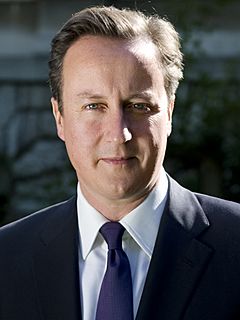
In 2009, she was chosen to run for the South West Norfolk constituency. Despite some local objections, she was elected as an MP in the 2010 general election.
Member of Parliament and Early Government Roles
As a new MP, Truss worked on issues important to her constituency, like protecting the RAF Marham airbase. She also co-founded the Free Enterprise Group, a group of Conservative MPs who believed in free markets and less government involvement. They wrote books suggesting policies like lower taxes.
Truss was very interested in education. She believed in stricter teaching methods, especially for mathematics. She thought math lessons should be required for all students until age 18.
Education Under-Secretary
In September 2012, Prime Minister David Cameron appointed Truss as the parliamentary under-secretary of state for education. In this role, she suggested increasing the number of children childminders could look after to reduce childcare costs. This idea faced criticism and was eventually blocked. She also proposed changes to A-level exams.
Environment Secretary
In July 2014, Truss became the Secretary of State for Environment, Food and Rural Affairs. Her department, Defra, handles issues like farming, food, and the environment. She supported plans to manage badger populations and worked on schemes to prevent food crime and insure homes against flooding.
During her time as Environment Secretary, Truss made a memorable speech in 2014 where she famously said, "We import two thirds of our cheese. That is a disgrace." This line was widely shared and mocked online.
Before the 2016 referendum on leaving the European Union, Truss supported remaining in the EU. However, after the public voted to leave, she accepted the decision and supported Brexit.
Justice Secretary and Lord Chancellor
In July 2016, Prime Minister Theresa May appointed Truss as Secretary of State for Justice and Lord Chancellor. This made her the first woman in the office's long history to hold the title of Lord Chancellor. Some people criticized her appointment because she did not have a legal background.
During her time, she worked to increase the number of prison officers. She also faced criticism for not strongly defending judges who made a ruling against the government regarding Brexit. Truss stated that she took her duty to defend judicial independence very seriously.
Chief Secretary to the Treasury
After the 2017 general election, Truss was moved to the role of Chief Secretary to the Treasury. This meant she could attend cabinet meetings but was not a full member. In this role, she focused on government spending and budgets. She became known for her active presence on social media, especially Twitter and Instagram.
Senior Cabinet Roles
International Trade Secretary
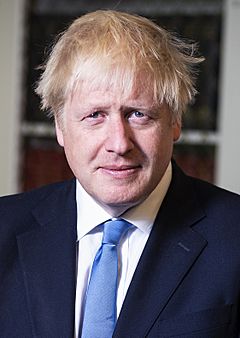
When Boris Johnson became prime minister in 2019, he appointed Truss as Secretary of State for International Trade and President of the Board of Trade. She also took on the additional role of Minister for Women and Equalities. In this role, she traveled internationally to negotiate trade deals for the UK, including with the US, Australia, and Japan. She was very enthusiastic about these negotiations.
Foreign Secretary
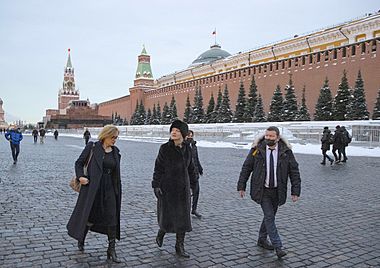
In September 2021, Truss was promoted to Secretary of State for Foreign, Commonwealth and Development Affairs, becoming the second woman to hold this important position. As Foreign Secretary, she worked on releasing British citizens detained abroad and focused on international relations.
In early 2022, her attention turned to the build-up of Russian troops near Ukraine. She supported sharing intelligence about Russia to weaken its government. In February 2022, she met with the Russian foreign minister in Moscow. She warned that the world was on the "brink of war in Europe" shortly before Russia invaded Ukraine. She strongly advocated for international sanctions against Russia.
Becoming Prime Minister
In July 2022, Boris Johnson resigned as prime minister. Liz Truss decided to run in the leadership election to replace him. She promised to cut taxes and help people with the rising cost of living.
After several rounds of voting by Conservative MPs, Truss and Rishi Sunak were the final two candidates. Conservative Party members then voted, and on 5 September 2022, Liz Truss was announced as the new leader. She won with 57% of the votes.
Premiership (2022)
Forming a Cabinet and the Queen's Death
On 6 September 2022, Queen Elizabeth II officially appointed Liz Truss as prime minister at Balmoral Castle. Truss then chose her cabinet ministers. For the first time in British history, no white men held the four most senior government positions.
Truss was the fifteenth and final prime minister to serve under Queen Elizabeth II. The Queen passed away just two days after appointing Truss, on 8 September. Truss paid tribute to the Queen, calling her "the rock on which modern Britain was built." Truss attended the Queen's funeral on 19 September.
Domestic Policies and Economic Challenges

On 8 September, Truss announced the Energy Price Guarantee to help people with the rising cost of living. This plan aimed to limit average household energy bills.
On 23 September, her government announced a "mini-budget" with significant tax cuts. The plan was to fund these cuts by borrowing money, hoping to boost economic growth. However, financial markets reacted negatively. The value of the British pound fell sharply, and the Bank of England had to step in to stabilize the economy. The plan faced widespread criticism from economists, other politicians, and the public.
Government Crisis and Resignation
After facing strong criticism, Truss's government began to reverse many of the tax cuts announced in the mini-budget. She also dismissed her finance minister, Kwasi Kwarteng, and replaced him with Jeremy Hunt. Hunt then reversed even more of the original policies.
Truss's popularity with the public dropped significantly. She faced increasing pressure and a loss of confidence in her leadership. On 19 October, she famously said in Parliament that she was a "fighter and not a quitter."
However, on 20 October, after just 45 days in office, Liz Truss announced her resignation as leader of the Conservative Party and as prime minister. She stated that she could not deliver the promises she had made due to the economic situation. She remained prime minister until a successor was chosen.
Rishi Sunak was elected as her successor on 24 October and became prime minister the next day. At 50 days, Liz Truss's premiership was the shortest in British history.
After the Premiership
After leaving office, Liz Truss remained an MP for South West Norfolk until the 2024 general election. In February 2023, she was reselected as the Conservative candidate for her constituency.
In September 2023, she announced that she would write a book about her time as prime minister, titled Ten Years to Save the West, which was published in April 2024. She has also spoken at events, blaming "groupthink" among officials and the media for the challenges during her time as prime minister. In February 2024, she helped launch the Popular Conservatism group.
In the 2024 United Kingdom general election, Liz Truss lost her seat in South West Norfolk to the Labour candidate, Terry Jermy.
Political Views
Domestic Issues
Truss generally supports economic ideas that involve less government control and more free markets. She believes in policies that aim to boost the economy by cutting taxes and reducing regulations.
While at university, Truss supported ending the monarchy. However, she later said she regretted that view. She has also spoken against "identity politics" and "cancel culture." She voted to make same-sex marriage legal.
Foreign Policy
Truss is known for having strong views on foreign policy. She has called for Britain to reduce its economic reliance on countries like China and Russia. She supported sanctions against Russia and has shown support for Taiwan. She has also spoken about human rights issues in Saudi Arabia.
Although she initially supported the UK remaining in the European Union in 2016, she later changed her mind and became a supporter of Brexit.
See also
 In Spanish: Liz Truss para niños
In Spanish: Liz Truss para niños
 | Chris Smalls |
 | Fred Hampton |
 | Ralph Abernathy |


